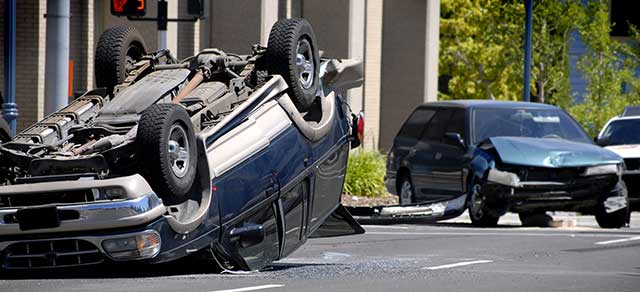 According to the National Safety Council, there are more than 12 million motor vehicle accidents in this country each year, involving more than 20 million vehicles. The National Highway Traffic Safety Administration reports that about 28 percent of the occupants of those cars suffer mild to moderate injuries, and 6 percent suffer severe to fatal injuries. This means there are about 2 million serious and disabling injuries each year, and one person is killed in a car accident every 15 minutes.
According to the National Safety Council, there are more than 12 million motor vehicle accidents in this country each year, involving more than 20 million vehicles. The National Highway Traffic Safety Administration reports that about 28 percent of the occupants of those cars suffer mild to moderate injuries, and 6 percent suffer severe to fatal injuries. This means there are about 2 million serious and disabling injuries each year, and one person is killed in a car accident every 15 minutes.
By the mandatory purchase of auto insurance, our system is designed to provide compensation for most of these injuries. However, during the claims process, insurance companies have only one goal in mind: pay as little as possible, regardless of the actual injuries or losses involved.
What to Do After an Automobile Accident
If you are injured in an automobile collision, you should know your rights. The following is a partial list of things you should know or do following a car accident:
- Record the facts. Be sure the accident is reported to the police and that the investigating officer knows the facts that you know. Consider making your own notes about who was involved, who witnessed the accident, and how the accident occurred. Take photographs of the scene, your vehicle, and the other vehicles involved. The vehicles may not be preserved very long in their wrecked condition, and photos of them may be essential to showing, at a later date, the severity of the accident or how it occurred.
- Get medical treatment promptly. Sometimes people suffer injuries in a car accident and delay going to the hospital or doctor’s office; they believe their injury is not that bad, or they believe they are going to get better. Sometimes they are wrong, and the injuries get worse. The insurance company will use your delay in getting treatment against you. If you have injuries, get them checked out right away. Document what you are going through by making notes about your injuries or taking photos to show them.
- Do not give the insurance company a written or oral statement. You have no duty to give a statement to an insurance company whose interests are adverse to you, and in most cases you should not do so.
- Contact a lawyer early. By contacting a lawyer soon after an accident, you avoid the risks associated with preserving the evidence, assessing the insurance coverage, and settling at an inappropriate time.
- Do not settle your case without knowing all of the insurance and liability issues involved. Claims often involve multiple parties and multiple insurance companies. Sometimes the negligent driver was on a work-related errand at the time of the accident, thus making his employer liable. Sometimes there are excess or umbrella policies to consider in addition to the obvious ones. If the negligent driver does not have insurance or has inadequate insurance, you may need to consider your own uninsured motorist coverage or underinsured motorist coverage. Sometimes defects in either vehicle or in the roadway contributed to the accident. Many other factors can affect your right to recover in a particular case. It is often very important that you not settle any part of your claim until you have a full understanding of all parts of your claim.
- Do not settle your case without fully understanding your injury. If you settle your case thinking you are well on your way to recovery, then find that you have a medical setback, it is, most likely, too late to do anything about it. Do not settle your claim until your injury has resolved to the point you can determine its value.
Our offices handle car accident and truck accident cases in Missouri and Kansas and, in some circumstances, in other states as well. Call us. We will discuss your case with you and will represent you if it is appropriate to do so. Let us put our experience to work for you.